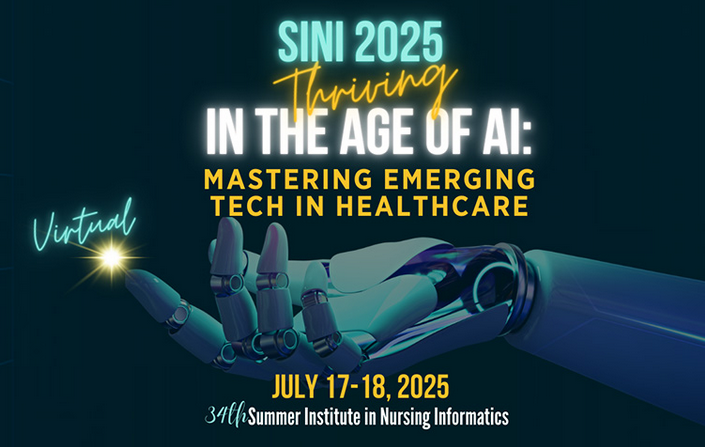'A Partner in Health Care’
Annual Summer Institute in Nursing Informatics (SINI) Talks Artificial Intelligence (AI)

There is a projected shortfall of more than 10 million health care workers by 2030.
Navigating an aging workforce, an increased demand for services, and a high burnout rate in the field, nurses are facing a crisis, said Kathleen McGrow, DNP ’14, MS ’02, BSN ’86, RN, PMP, FHIMSS, FAAN, global chief nursing innovation officer at Microsoft.
Enter artificial intelligence (AI).
“AI can actually help us automate some of these manual tasks that we’ve been doing so we can really focus on the high-value tasks that our providers really need to focus on,” said McGrow, who gave the keynote address, “Empowering Nurses with Artificial Intelligence,” at the 34th Summer Institute in Nursing Informatics (SINI), which the University of Maryland School of Nursing (UMSON) hosted virtually July 17 - 18.
SINI 2025, themed “Thriving in the Age of AI: Mastering Emerging Tech in Health Care,” brought together visionaries, informatics professionals, educators, and clinicians to explore the use of AI in nursing.
“The Summer Institute has always been a place to expand one’s knowledge and learn about the latest developments in informatics. It is also a place to explore emerging challenges, and, very importantly, a place for you to connect with colleagues and future colleagues in informatics,” said Yolanda Ogbolu, PhD ’11, MS ’05, BSN ’04, NNP, FNAP, FAAN, the Bill and Joanne Conway Dean of the University of Maryland School of Nursing (UMSON) and professor. “What makes this annual gathering really special is the timeliness of the issues that are always discussed. That is absolutely true for this year's conference. It explores the topic that is on all of our minds: How will we learn to thrive and master artificial intelligence and emerging technologies in our health care environment, nursing practice, and education?”
Improving Patient Outcomes
Eighty-four percent of health care executives believe AI is going to revolutionize how they get information, McGrow said.
From accelerating drug discovery, clinical trials, and supply chain management to improving communication and the patient experience (81% of patients say they’re unsatisfied with their current health care experience, McGrow said), AI presents an opportunity to provide more personalized, efficient, and responsive care.
“AI understands complex situations. It can do multiple-step tasks. It can help us complete end-to-end workflows,” McGrow explained. “So, this really is set up to reduce cognitive load for our clinicians and allow them to focus on higher-value activities and patient care.”
AI is a combination of capabilities, natural language understanding, contextual memory, and advanced reasoning, she added.
“That means that AI can really be a partner in health care, and it can help us navigate our information better. It can help us make better decisions and ultimately improve outcomes for the patients and the providers,” McGrow said.
Reducing Cognitive Load
Michael Hasselberg, PhD, RN, PMHNP-BC, a professor of psychiatry, clinical nursing, and data science at the University of Rochester (UR) in New York, provided insight into just how AI, and especially generative AI, can help reduce administrative burdens and increase focus on the human aspects of care.
Hasselberg shared his involvement in experimenting with AI to help triage patient messages to physicians in medical portals. Each day, he said, physicians spend a significant amount of time going through patient messages; there are nurses whose jobs are dedicated to organizing these messages and deciding which can be handled by the front desk, which can be answered by the nursing staff, and which need to be responded to by a doctor, he added.
And it’s no small number of messages.
“Whether that be through email, whether that be through patient portal messages, whether that be through telehealth or SMS texting, we’ve done a really good job of creating that seamless connection, but to the detriment of our clinicians, who are getting burnt out by all of this coming into the inbox,” Hasselberg said.
Over the last five years, he added, there’s been a 300% increase in patient portal messages.
After multiple attempts using different iterations of AI, Hasselberg and his team have been able to use the technology to improve how quickly messages are triaged.
“We have, across our primary care practice on any given day, around 1,600 patient messages that get sent in. And imagine we had an army of nurses trying to triage these messages. A nurse could get through maybe 50 messages a day,” he said. “We found that GPT (Generative Pre-Trained Transformer, a type of neural network-based language model that generates human-like text) could get through all of those messages in a day with no problem, at a cost of under $15.”
The afternoon featured a closing panel discussing the topic “Leading the Next Wave: Ethical, Practical, and Strategic AI in Health Care.” The panel, moderated by assistant professors Ernest Opoku-Agyemang, PhD, MA, RN, and Cory Stephens, DNP, RN, NI-BC, CPHIMS, FHIMSS, CNE, addressed critical topics such as ethical considerations in AI and health care, cybersecurity challenges and solutions, and practical applications and governance of AI in health systems.
Stephens discussed UMSON’s new Nurse Support Program II-funded statewide program, AI in Maryland Higher Education, known as AIM-High, designed to strengthen Maryland nurse educators’ capacity to integrate AI into nursing education.
“If you are a Maryland nurse educator interested in professional development and AI, please consider participating,” he said. AIM-High will establish a sustainable network for collaboration and resource sharing to foster continued innovation.
Wrapping up the day with closing remarks, Cheryl Fisher, EdD, MSN, RN, associate professor and co-director of the Master of Science in Nursing’s Nursing Informatics specialty and of the Nursing Informatics Certificate, said, “It’s been an incredible day of connections, insights, and inspirations.”
Next year will mark SINI’s 35th anniversary, she noted, with a theme of “From Legacy to Leadership in a Time of Transformation in Nursing Practice.” More information will be available on the SINI webpage.